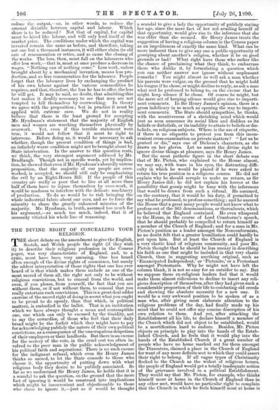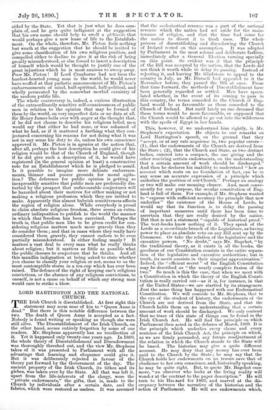THE DIVINE RIGHT OF CONCEALING YOUR RELIGION.
THE short debate on the amendment to give the English, Scotch, and Welsh people the right (if they wish it) to describe their religious profession in the Census paper, was very characteristic of England, and, to a cynic, must have been very amusing. One has heard often enough of the divine rights of conscience, but surely the oddest interpretation of those rights that one has ever heard of is that which makes them include as one of the most sacred of them all, the right not only to be without religious convictions, but to conceal from the world, and even, if you please, from yourself, the fact that you are without them, or if not without them, to conceal that you really entertain such convictions. This is a great deal odder exercise of the sacred right of doing in secret what you ought to be proud to do openly, than that which, in political matters, is embodied in the ballot. That is an institution which we have always thought a mean and contemptible one, one which can only be excused by the timidity, not to say the cowardice, of those who feel that their daily bread might be the forfeit which they might have to pay for acknowledging publicly the nature of their own political convictions, as a consequence of the unscrupulous despotism of their employers or their landlords. But there is an excuse for the secrecy of the vote, in the cruel cost too often in- volved to the poor man in the public acknowledgment of his political faith and aspirations. There is no such excuse for the indignant refusal, which even Sir Henry James thinks so sacred, to let the State concede to those who choose it, the opportunity of putting down with what religious body they desire to be publicly associated. So far as we understand Sir Henry James, be holds that it is a scandal to ask the question, on the ground that the mere fact of ignoring it would be construed into implications which might be inconvenient and objectionable to those who chose to ignore it,—just as it would be thought a scandal to give a lady the opportunity of publicly stating her age, since the mere fact of her not availing herself of that opportunity, would give rise to the inference that she was older than she seemed. Sir Henry James treats the suggestion of having a religious column in the Census paper as an impoliteness of exactly the same kind. What can be more indecent than to give any one a public opportunity of gossiping about another's religion, whether it be on good grounds or bad? What right have those who rather like the chance of proclaiming what they think, to embarrass those who dislike it, by formulating a question which you can neither answer nor ignore without unpleasant , remarks ? You might almost as well ask a man whether his parents were vulgar, on the ground that he might hold his tongue if he chose, or might decline to reply, as ask a man what sect he professed to belong to, on the excuse that he might keep silence if he chose. Of course he might, but the mere act of keeping silence would give rise to imperti- nent comments. In Sir Henry James's opinion, there is a gross indelicacy in so much as opening the way to imperti- nent comments. The State should sympathise, he thinks, with the sensitiveness of a shrinking mind which would just as soon announce its social likes and dislikes as its beliefs or disbeliefs, or its inability to attain to beliefs or dis- beliefs, on religious subjects. Where is the use of etiquette, if there is no etiquette to protect you from this incon- venient cross-examination on private matters ? " Let us be genteel or die," says one of Dickens's characters, as she draws on her gloves. Let us assert the divine right to ignore divine things at pleasure, says Sir Henry James. But the most pathetic figure in the short debate was that of Mr. Picton, who explained to the House almost, we may say, with tears in his eyes, the distracting diffi- culty in which he would be placed if he were asked to return his true position in a religious census. He did not explain why he should scruple to make no return, as Sir Henry James did ; he did not explain his horror at the possibility that gossip might be busy with the inferences that would be drawn from such a refusal. He assumed, on the contrary, that it would be his duty, if permitted to say what he professed, to profess something ; and he assured the House that a great many people would not know what to profess out of the 365 denominations, or thereabouts, which he believed that England contained. He even whispered to the House, in the course of Lord Cranborne's speech, that he should probably be compelled to return himself as a member of the Church of England; and for a man in Mr. Picton's position as a leader amongst the Nonconformists, he no doubt felt that a greater humiliation could hardly be put upon him. But at least the Church of England is a very elastic kind of religious community, and poor Mr. Picton thought that he should be less uneasy in describing his faith as one that might be included in that very elastic Church, than in suggesting anything original, such as Emancipated Independent,' or Pictonite,' or a Protestant amongst Protestants. Why he might not have left the column blank, it is not so easy for an outsider to say. But we suppose these ex-religious leaders feel that it would make them almost ridiculous to decline to insert any reli- gious description of themselves, after they had given such a considerable proportion of their life to combating old creeds and showing the absolute necessity for a new one. It would be a very awkward position to be spoken of as a man who, after giving most elaborate attention to the religious problems of the day, had finally made up his mind that he could not offer any concise description of his own relation to them. And yet, after attacking the Establishment all his life, to declare himself a member of the Church which did not object to be established, would be a mortification hard to endure. Besides, Mr. Picton objects on principle to play into the hands of the Estab- lished Church, and he feels that it would play into the hands of the Established Church if a great number of people who have no home marked out for them amongst the Dissenters, claimed a place in the Church of England for want of any more definite sect to which they could assert their right to belong. If all vague types of Christianity flocked to the Church as the widest of religious homes, the people of England would get a totally inadequate notion of the grievance involved in a political Establishment. They would say that Mr. Picton, for example, who thinks himself more at home in the Church of England than in any other sect, would have no particular right to complain that the Church in which he feels himself most at home is aided by the State. Yet that is just what he does com- plain of, and he gets quite indignant at the suggestion that his own name should help to swell a plebiscite that would perhaps give a new lease of life to the Establish- ment. On the whole, therefore, Mr. Picton feels nothing but wrath at the suggestion that he should be invited to give some classification of his own religious position, and compelled either to decline to give it at the risk of being greatly misunderstood, or else forced to insert a description of himself which would be thought to justify one of the great injustices which he is most anxious to sweep away. Poor Mr. Picton ! If Lord Cranborne had not been the hardest-hearted young man in the world, he would never have scoffed at that pathetic announcement of Mr. Picton's embarrassments of mind, half-spiritual, half-political, and wholly permeated by the somewhat morbid casuistry of the modern public life. The whole controversy is, indeed, a curious illustration of the extraordinarily sensitive self-consciousness of public men in relation to the opinion that may be formed of them by the world, on very imperfect data or no data at all. Sir Henry James boils over with anger at the thought that, if he did not choose to describe his religious belief, men would say that either he had none, or was ashamed of what he had, as if it mattered a farthing what they con- jectured concerning his reasons for not doing what it was not in any sense his duty to do, unless his own conscience approved it. Mr. Picton is in agonies at the notion that, after all, perhaps the best description he could give of his religion would be that of the Church of England, though if he did give such a description of it, he would have registered (in the general opinion at least) a constructive vote for an Establishment which he is pledged to assail. Is it possible to imagine more delicate embarrass- ments, thinner and poorer grounds for moral agita- tion? The deference for public opinion is getting so inexpressibly sensitive that public men are profoundly dis- turbed by the prospect that unfavourable conjectures will be hazarded about their motives for either making or not making a religious profession which they are invited to make. Apparently this almost babyish sensitiveness affects the region of religion alone. While everybody is proud to claim absolute religious freedom, there seems an extra- ordinary indisposition to publish to the world the manner in which that freedom has been exercised. Perhaps the truth is, that public men like to be given credit for con- sidering religious matters much more gravely than they do consider them ; and that in cases where they really have considered them gravely, they cannot endure to be even partially misunderstood. Is either feeling manly ? It matters a vast deal to every man what he really thinks about religion ; but it matters as little as possible what the public chooses to conjecture that he thinks. And all this maudlin indignation at being asked to state whether you choose to classify your religion or not, seems to us the most contemptible storm in a tea-cup which has ever been raised. The defence of the right of keeping one's religious convictions, or the absence of any religious convictions, to oneself, is not a cause on behalf of which any strong man would care to strike a blow.



































 Previous page
Previous page